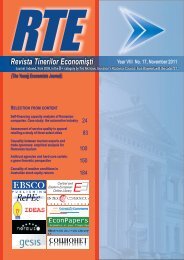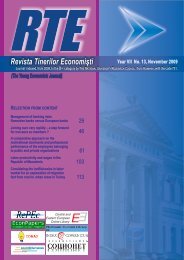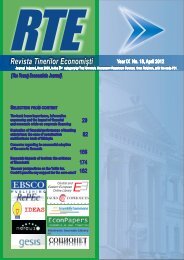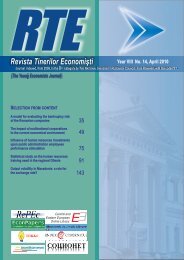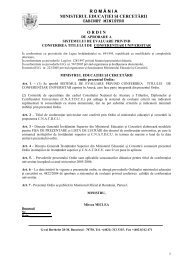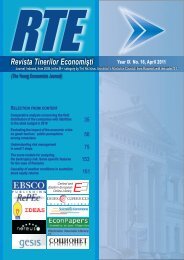Implications of change management in public administration
Implications of change management in public administration
Implications of change management in public administration
Create successful ePaper yourself
Turn your PDF publications into a flip-book with our unique Google optimized e-Paper software.
Economic Theories – International Economic Relations<br />
black labor. The situation is different from one state to another.<br />
The concrete proposals <strong>of</strong> the Commission on the report <strong>of</strong> the black market are<br />
the follow<strong>in</strong>g:<br />
The larger reduction <strong>of</strong> the social contributions and bureaucratic procedures,<br />
pr<strong>in</strong>ciples which are mentioned <strong>in</strong> the Lisbon Strategy for growth and development <strong>of</strong><br />
the work<strong>in</strong>g places<br />
Member states should revise the traditional regulations regard<strong>in</strong>g the labor<br />
legislation, because most <strong>of</strong> them limit the mobility <strong>of</strong> the workers <strong>in</strong> the new member<br />
states;<br />
Facilitat<strong>in</strong>g the good practices system, systematization <strong>of</strong> the evaluation <strong>of</strong> the<br />
policies <strong>in</strong> this field and study<strong>in</strong>g the situation <strong>of</strong> the black labor market;<br />
Member states are <strong>in</strong>vited to consider the possibility <strong>of</strong> a European cooperation<br />
platform between the labor <strong>in</strong>spectorates and other agencies from the field.<br />
Active <strong>in</strong>volvement <strong>of</strong> the workers and representatives <strong>of</strong> the employees <strong>in</strong> the<br />
fight aga<strong>in</strong>st this practice;<br />
The Lisbon agenda has become known through the objective which it follows,<br />
the transformation <strong>of</strong> the European economy <strong>in</strong> the most competitive and dynamic<br />
economy based on knowledge, which is able <strong>of</strong> economic growth, with more and better<br />
work<strong>in</strong>g places and an <strong>in</strong>creased social cohesion. In order to reach up to 2010, this<br />
objective (as the member states proposed <strong>in</strong> 2000), the EU countries should coord<strong>in</strong>ate<br />
their efforts <strong>in</strong> order to obta<strong>in</strong> not only a radical transformation <strong>of</strong> the economy but also<br />
the adoption <strong>of</strong> an ambitious program <strong>of</strong> modernization <strong>of</strong> the social and educational<br />
system.<br />
The Bologna process has gradually <strong>in</strong>creased from 29 states <strong>in</strong> 1999 to 46 <strong>in</strong><br />
present. This expansion denotes the fact that the European countries have<br />
acknowledged that the national education systems are confronted with <strong>in</strong>ternal and<br />
external challenges related to the growth and diversification <strong>of</strong> the university curricula,<br />
the possibilities <strong>of</strong> employ<strong>in</strong>g the graduates, the lack <strong>of</strong> clarifications <strong>in</strong> key fields and<br />
the development <strong>of</strong> private education <strong>in</strong>stitutions and <strong>of</strong> the transnational education.<br />
The affiliation <strong>of</strong> the countries to the Bologna Process makes possible f<strong>in</strong><strong>in</strong>g some<br />
unitary <strong>in</strong>struments and solutions which could help at solv<strong>in</strong>g these problems and to<br />
meet the objectives <strong>of</strong> the Lisbon Agenda.<br />
Tak<strong>in</strong>g <strong>in</strong>to account the fact that the Bologna process is focused only on higher<br />
education, after adopt<strong>in</strong>g the Lisbon Agenda it became clear that one should have taken<br />
measure <strong>in</strong> the field <strong>of</strong> pr<strong>of</strong>essional development and lifelong learn<strong>in</strong>g. In consequence,<br />
<strong>in</strong> 2002 the Copenhagen process was launched with the purpose <strong>of</strong> strengthen<strong>in</strong>g the<br />
quality and the attractiveness <strong>of</strong> the pr<strong>of</strong>essional development and to promote mobility<br />
around students and graduates from the pr<strong>of</strong>essional development area.<br />
In 2002, <strong>in</strong> order to <strong>in</strong>tegrate the previous actions <strong>in</strong> the field <strong>of</strong> education and<br />
formation on a European level (<strong>in</strong>clud<strong>in</strong>g the Copenhagen process) as well as the<br />
actions carried out by the European Council from Barcelona, they have adopted a<br />
work<strong>in</strong>g program ”Education and formation 2010” (Barcelona).<br />
The work<strong>in</strong>g program identifies three strategic objectives:<br />
Improv<strong>in</strong>g the quality and efficiency <strong>of</strong> the European education and formation<br />
systems;<br />
Improv<strong>in</strong>g the access to education and tra<strong>in</strong><strong>in</strong>g ;<br />
Open<strong>in</strong>g the education and tra<strong>in</strong><strong>in</strong>g system to the whole world;<br />
125



